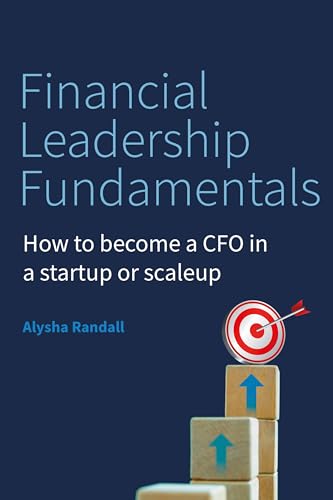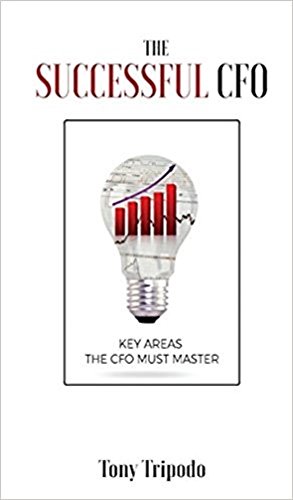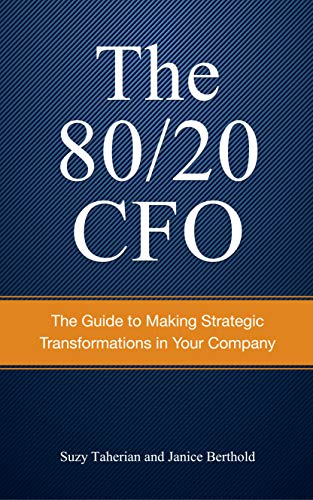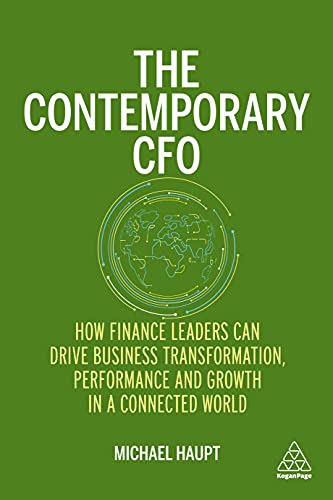
1

2

3

4

5
The role of the Chief Financial Officer (CFO) has evolved from financial oversight to a strategic leadership position. Today’s CFOs must drive business growth, lead innovation and communicate effectively across the organisation. To succeed in this dynamic role, it’s essential to gain insights into leadership, decision-making and financial strategy. These five books offer practical tools and strategies to help you elevate your skills, make smarter decisions and create lasting impact as a CFO.
1
Financial Leadership Fundamentals by Alysha Randall is a practical guide for aspiring finance leaders, especially those transitioning into CFO roles within startups and scaleups. The book offers actionable steps to help finance professionals evolve into strategic leaders. It emphasises the importance of effective communication with key stakeholders, including the board, investors and the leadership team, to influence decisions and align financial strategies with business goals. The book also covers how to prepare for fundraising, whether through equity or debt, equipping finance leaders to navigate the capital-raising process successfully. Additionally, the book focuses on choosing and implementing the right finance technology to streamline operations and improve decision-making. It stresses the need for finance leaders to go beyond reporting numbers and use financial insights to actively drive business decisions. Finally, Financial Leadership Fundamentals highlights the importance of developing a scalable finance function that can grow with the business, ensuring financial processes evolve alongside company expansion. The book provides a roadmap for finance leaders to become strategic, impactful leaders in a fast-growing business environment.
2
The CFO's First 100 Days is a practical guide for newly appointed CFOs and Finance Directors looking to make an immediate impact. It provides actionable strategies to navigate the critical first 100 days with confidence, covering key areas like strategic planning and execution, where readers learn to align business goals with financial strategies. The book also emphasises risk management, offering techniques to identify and mitigate risks for stability and growth. It delves into financial reporting and analysis, guiding CFOs on how to use data for informed decision-making. The book also focuses on team building and leadership, helping readers develop high-performing teams and leadership skills. Communication and influence are also key themes, with advice on how to effectively share financial insights and engage stakeholders. Finally, the book encourages continuous improvement and learning, urging finance leaders to stay adaptable and proactive. Supported by real-world case studies, The CFO's First 100 Days offers a roadmap for successfully transitioning into senior finance leadership, helping new CFOs lead with impact from day one.
3
In The Successful CFO, Tony Tripodo, named CFO of the Year by the Houston Business Journal in 2014, shares his wealth of experience accumulated over 40 years in various CFO roles. Drawing from his extensive background as both a CFO and board member, as well as his entrepreneurial ventures, Tripodo offers valuable lessons on what it takes to succeed in this increasingly complex and competitive business environment. The book outlines key principles and strategies for CFOs to become dynamic, positive influencers within their organisations. With a focus on practical insights, Tripodo shares what works and what doesn’t when it comes to driving success in the role of CFO. Through his reflections, readers gain an understanding of the essential qualities and approaches that enable CFOs to effectively lead, influence and make impactful decisions within their organisations.
4
The 80/20 CFO: How to Make Strategic Transformations in Your Company by Janice Berthold and Suzy Taherian is a practical guide for CFOs looking to make an immediate impact. The book offers actionable advice on quickly gaining credibility and trust, which is essential for driving change in an organisation. It addresses the challenge many CFOs face of vague job descriptions and offers clear strategies to understand responsibilities and contribute effectively from day one. Recognising the isolating nature of the role, the authors emphasise the importance of building relationships with key stakeholders and aligning actions with company goals. By focusing on these elements, CFOs can position themselves as catalysts for transformation and success.
5
The Contemporary CFO by Michael Haupt addresses the evolving role of CFOs in the digital age and the increasing responsibility they have in leading enterprise-wide business transformation. As businesses face rapid, fundamental changes driven by the digital revolution, CFOs play a critical role in not only adapting their own finance functions but also guiding the broader organisation through these shifts. The book explores key questions, such as how CFOs can manage resources and performance more dynamically, contribute to the creation of new business models like digital platforms, and enable sustainable growth and value creation for multiple stakeholders. Drawing on practical experience and extensive research, including interviews with corporate leaders, it provides guidance for current and future finance leaders to navigate a complex, connected and unpredictable business world. It offers insights on the latest trends, challenges and strategies to help CFOs succeed in transforming businesses in the digital era.

1
Financial Leadership Fundamentals by Alysha Randall is a practical guide for aspiring finance leaders, especially those transitioning into CFO roles within startups and scaleups. The book offers actionable steps to help finance professionals evolve into strategic leaders. It emphasises the importance of effective communication with key stakeholders, including the board, investors and the leadership team, to influence decisions and align financial strategies with business goals. The book also covers how to prepare for fundraising, whether through equity or debt, equipping finance leaders to navigate the capital-raising process successfully. Additionally, the book focuses on choosing and implementing the right finance technology to streamline operations and improve decision-making. It stresses the need for finance leaders to go beyond reporting numbers and use financial insights to actively drive business decisions. Finally, Financial Leadership Fundamentals highlights the importance of developing a scalable finance function that can grow with the business, ensuring financial processes evolve alongside company expansion. The book provides a roadmap for finance leaders to become strategic, impactful leaders in a fast-growing business environment.

2
The CFO's First 100 Days is a practical guide for newly appointed CFOs and Finance Directors looking to make an immediate impact. It provides actionable strategies to navigate the critical first 100 days with confidence, covering key areas like strategic planning and execution, where readers learn to align business goals with financial strategies. The book also emphasises risk management, offering techniques to identify and mitigate risks for stability and growth. It delves into financial reporting and analysis, guiding CFOs on how to use data for informed decision-making. The book also focuses on team building and leadership, helping readers develop high-performing teams and leadership skills. Communication and influence are also key themes, with advice on how to effectively share financial insights and engage stakeholders. Finally, the book encourages continuous improvement and learning, urging finance leaders to stay adaptable and proactive. Supported by real-world case studies, The CFO's First 100 Days offers a roadmap for successfully transitioning into senior finance leadership, helping new CFOs lead with impact from day one.

3
In The Successful CFO, Tony Tripodo, named CFO of the Year by the Houston Business Journal in 2014, shares his wealth of experience accumulated over 40 years in various CFO roles. Drawing from his extensive background as both a CFO and board member, as well as his entrepreneurial ventures, Tripodo offers valuable lessons on what it takes to succeed in this increasingly complex and competitive business environment. The book outlines key principles and strategies for CFOs to become dynamic, positive influencers within their organisations. With a focus on practical insights, Tripodo shares what works and what doesn’t when it comes to driving success in the role of CFO. Through his reflections, readers gain an understanding of the essential qualities and approaches that enable CFOs to effectively lead, influence and make impactful decisions within their organisations.

4
The 80/20 CFO: How to Make Strategic Transformations in Your Company by Janice Berthold and Suzy Taherian is a practical guide for CFOs looking to make an immediate impact. The book offers actionable advice on quickly gaining credibility and trust, which is essential for driving change in an organisation. It addresses the challenge many CFOs face of vague job descriptions and offers clear strategies to understand responsibilities and contribute effectively from day one. Recognising the isolating nature of the role, the authors emphasise the importance of building relationships with key stakeholders and aligning actions with company goals. By focusing on these elements, CFOs can position themselves as catalysts for transformation and success.

5
The Contemporary CFO by Michael Haupt addresses the evolving role of CFOs in the digital age and the increasing responsibility they have in leading enterprise-wide business transformation. As businesses face rapid, fundamental changes driven by the digital revolution, CFOs play a critical role in not only adapting their own finance functions but also guiding the broader organisation through these shifts. The book explores key questions, such as how CFOs can manage resources and performance more dynamically, contribute to the creation of new business models like digital platforms, and enable sustainable growth and value creation for multiple stakeholders. Drawing on practical experience and extensive research, including interviews with corporate leaders, it provides guidance for current and future finance leaders to navigate a complex, connected and unpredictable business world. It offers insights on the latest trends, challenges and strategies to help CFOs succeed in transforming businesses in the digital era.
© Five Books 2026